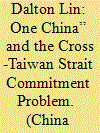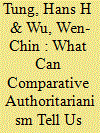| Srl | Item |
| 1 |
ID:
189500


|
|
|
|
|
| Summary/Abstract |
Fifty years after the current “one China” framework emerged in international politics, the cross-Taiwan Strait “one China” dispute has transformed from its historical nature of indivisible sovereignty. As Taipei has stopped competing internationally to represent “China” since 1991, Beijing now worries that compromising its “one-China principle” in cross-Strait reconciliation would enhance Taiwan's separate statehood internationally and enable the island to push towards de jure independence. In contrast, Taipei worries that any perceived concessions on the question of “one China” would enhance China's sovereignty claim over Taiwan and enable Beijing to push for unification coercively with fewer concerns about international backlash. Improved cross-Strait relations thus rely on circumventing this quintessential commitment problem in international politics.
|
|
|
|
|
|
|
|
|
|
|
|
|
|
|
|
| 2 |
ID:
189404


|
|
|
|
|
| Summary/Abstract |
This paper provides a new approach to studying the behavior of groups engaged in civil war termination bargaining by focusing on the commitment problem. Extending the basic Rubinstein bargaining model, the model presented here has the added feature of a reneging option for the stronger group after an agreement is reached. This leads to the prediction that when groups expect the absence of an enforcement mechanism, the stronger group makes a larger concession, while the weaker group makes a more demanding offer, than would be expected according to the relative power dynamic between groups. On the other hand, when groups expect that a third-party peace operator will enforce an agreement, groups’ offers more closely reflect their relative power situation. To illustrate the causal process of groups’ bargaining behavior, five bargaining attempts during Sierra Leone’s civil wars from 1991 to 2002 are examined.
|
|
|
|
|
|
|
|
|
|
|
|
|
|
|
|
| 3 |
ID:
183632


|
|
|
|
|
| Summary/Abstract |
This paper evaluates the progress and impact of the literature on comparative authoritarianism, showing not only how its development over the previous two decades can help us understand China’s authoritarian politics better, but also how the latter can move the former forward. We focus on two important topic areas in the literature: authoritarian power-sharing and autocratic politics of information (e.g., partial media freedom and government censorship). For the first topic, we shall review the literature on the authoritarian power-sharing between dictators and their allies and explicate how this conceptual innovation helps us understand the institutional foundation of China’s regime stability and phenomenal economic performance before Xi Jinping. The analysis then provides us a baseline for assessing China’s economic and political future under Xi Jinping given his clear departure from the pre-existing power-sharing framework. Finally, this paper also assesses the relevance of the literature on authoritarian politics of information to the Chinese context. In sum, we not only emphasize the conceptual contributions of the literature of comparative authoritarianism to the field of Chinese politics, but also identify lacunae in the current literature and avenues for future research that post-Xi political developments have made visible to us.
|
|
|
|
|
|
|
|
|
|
|
|
|
|
|
|